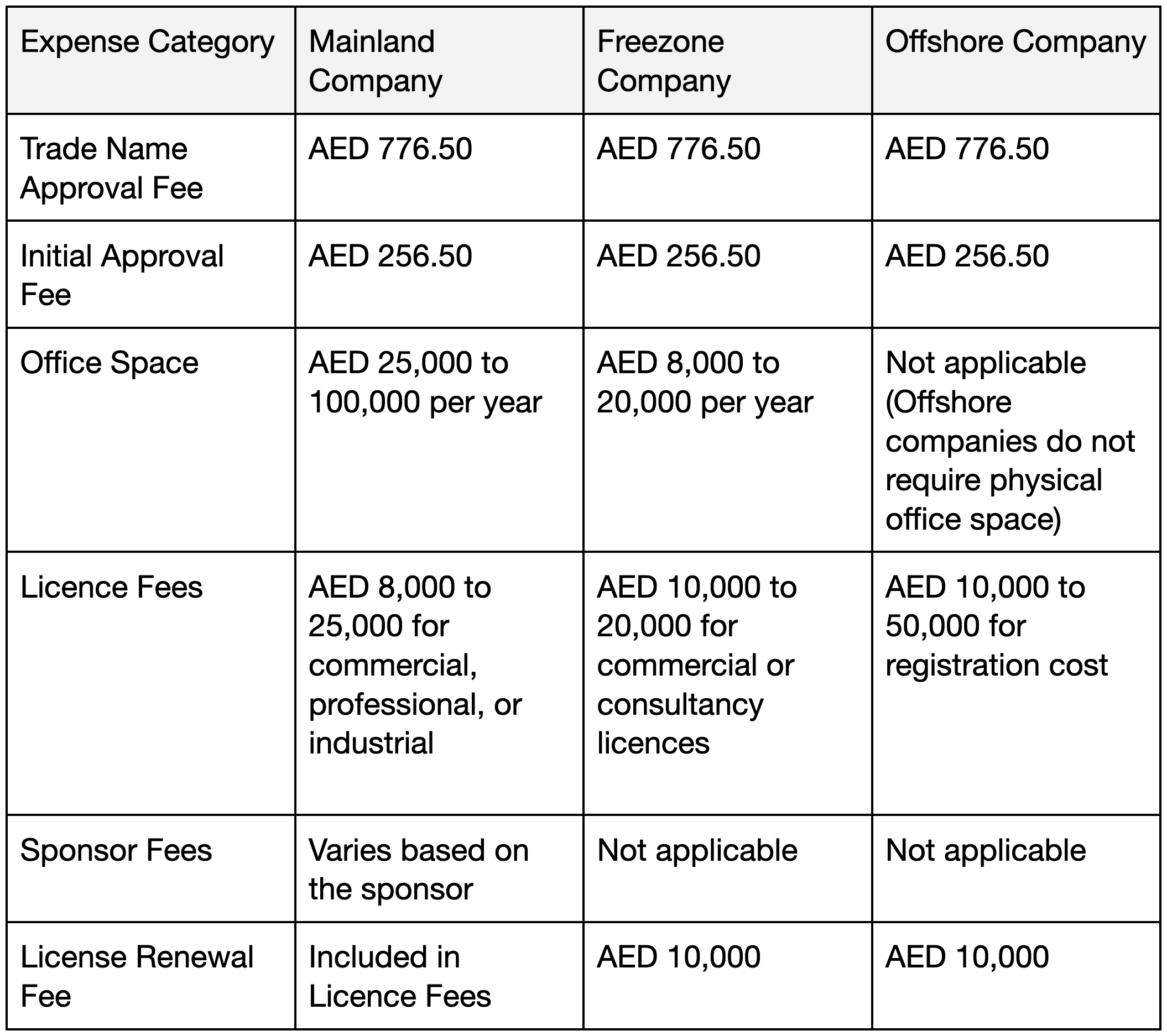



The International Monetary Fund (IMF) reveals that in 2023, the UAE’s economy was valued at over $527.8 billion. The country is home to over 300,000 small and medium-sized enterprises (SMEs), which contribute nearly 60% to its non-oil GDP. With its thriving sectors, including real estate, tourism, technology, and finance, the UAE offers fertile ground for start-ups and established businesses alike.
The nation’s business-friendly policies, such as 100% foreign ownership in many sectors, zero income tax, and extensive free zones, inarguably make it an attractive destination for foreign investors and entrepreneurs. However, before you take the plunge and establish your business in this vibrant market, it’s crucial to understand the costs involved in setting up and operating in the UAE. These costs, along with other key considerations like legal structures and cultural factors, can significantly impact the success of your venture.
Setting up a company in the UAE can vary depending on the business type, location, and licensing requirements. When starting a business, it’s essential to budget for several key expenses that will form the foundation of your venture. Below is a table with the tentative costs for starting a Mainland, Freezone, or Offshore company in the country.

Once your business is up and running in the UAE, several operational costs will become part of your regular budget. Here’s a list of potential expenses to consider:
Salaries can vary widely depending on the industry and the specific roles you’re hiring for. It’s important to budget for competitive pay, which may also need to include benefits like health insurance and end-of-service gratuity.
Utilities are another major cost to consider, particularly in bustling regions like Dubai, where electricity, water, and internet expenses can add up quickly. Ensuring that you have a realistic budget for these is crucial to avoid any surprises.
Marketing and advertising will also play a vital role in growing your business. Whether you choose digital channels like social media or more traditional methods like print or outdoor advertising, the costs can vary significantly, so planning ahead is key.
Don’t forget about the ongoing expenses for maintaining your office or retail space, along with insurance for your business, employees, and assets. Regular maintenance and comprehensive insurance coverage are essential to protect your investment and ensure smooth operations.
It’s crucial to understand the legal and regulatory environment in the UAE when establishing a successful business. One of the initial decisions you will face is selecting the right business structure, such as a Limited Liability Company (LLC), Free Zone Company, or Sole Proprietorship. Each comes with specific requirements and costs, so it’s important to choose the one that best fits your business goals.
Compliance with local laws and regulations is another critical aspect. Your business activities must always align with the terms of your license, and you’ll need to renew that license annually to avoid any penalties. This ongoing compliance is key to maintaining your business’s good standing in the UAE.
Additionally, protecting your intellectual property is a vital consideration. Whether it’s trademarks, patents, or copyrights, safeguarding your brand, products, and services is essential. Keep in mind that the registration fees for intellectual property can add to your startup costs, but it’s an investment that pays off by securing your business assets in the long term.
Finally, grasping the cultural and market landscape in the UAE is essential to your business’s success. The following details the cultural and market considerations for starting a business in the UAE.
Understanding your target audience, competitors, and the overall market demand will enable you to make well-informed decisions and tailor your products or services to meet the specific needs of the local market.
Building strong relationships with local businesses, government authorities, and potential customers can make a significant difference in your success. To achieve this, actively engage in the local business community by attending industry events, joining business councils, and seizing opportunities to connect with key players in your sector.
The UAE is a melting pot of cultures, each with its own customs and practices. Being mindful of these cultural nuances and showing respect for local traditions can help you build trust and forge strong, lasting business relationships in this diverse environment.
In summary, it can be said that starting a business in the UAE is more than just an opportunity—it’s a gateway to unlocking your entrepreneurial dreams in one of the most vibrant markets on the planet. However, this journey requires more than just ambition; it demands careful planning and a deep understanding of the costs and challenges ahead. With the right preparation, you can build a thriving business that not only succeeds in the UAE but also stands out in the global marketplace.
Don’t forget to share this post!
We use cookies to enhance your experience on our website. If you continue using this website, we assume that you agree with these. Learn more.



Excellent guide on understanding the true costs of starting and running a business in the UAE! These practical insights are essential for anyone looking to navigate the financial side of entrepreneurship.